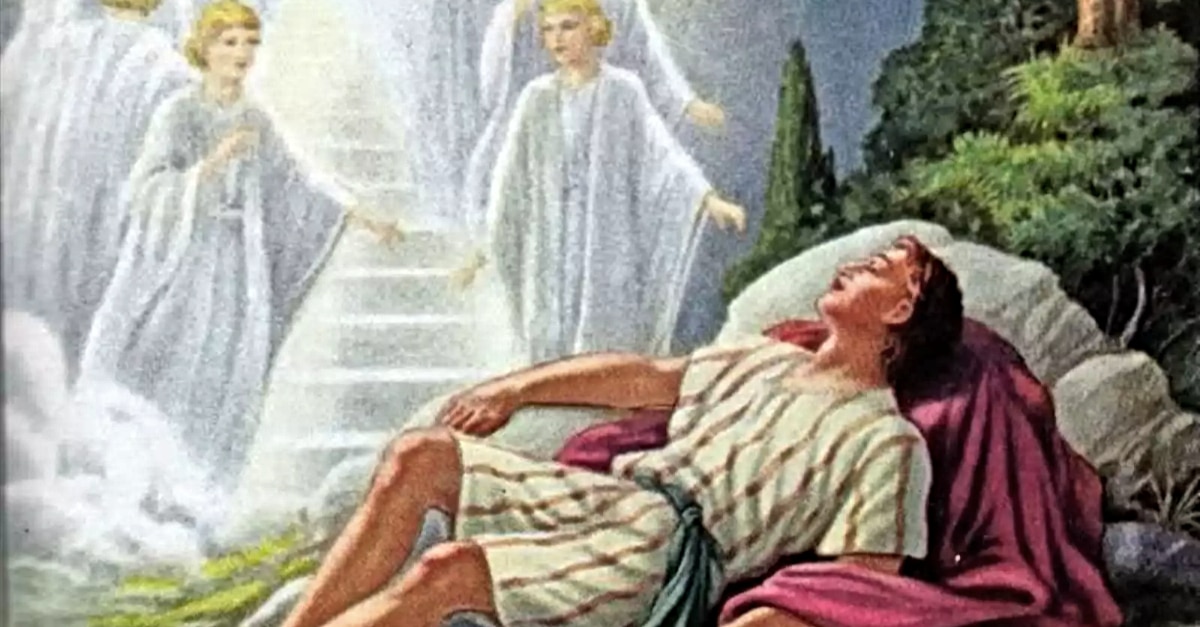Jacob’s Dream at Bethel
Genesis 28:10-22
Introduction
Genesis 28:10-22 recounts the famous story of Jacob’s dream at Bethel. It is a powerful account that reveals important lessons about God’s faithfulness and His enduring presence in our lives. This dream is significant because it marks a turning point in Jacob’s life and sets the stage for the rest of the book of Genesis.

Setting the Scene
Jacob’s flight to Paddan-Aram can be traced back to a series of events involving his twin brother Esau and their father Isaac. The story begins with Jacob and Esau being born to Isaac and Rebekah. Esau was the elder twin, and according to the custom of the time, he was entitled to receive a special blessing from his father, which included inheritance rights and a leadership role within the family.
However, Rebekah favoured Jacob more than Esau, and devised a plan for Jacob to deceive Isaac and secure the blessing for himself. When Isaac became old and his eyesight was failing, he called Esau and asked him to prepare a delicious meal so that he could bless him before his impending death. Rebekah overheard this conversation and quickly devised a plan. She instructed Jacob to dress in Esau’s clothing, cover his arms with goat skin to mimic Esau’s hairy arms, and bring a meal prepared by her. Jacob, initially hesitant, eventually agreed to follow his mother’s instructions.
Jacob approached Isaac pretending to be Esau, and although Isaac had doubts due to Jacob’s voice, the smell of Esau’s clothes and and the hairiness of his arms convinced him and he eventually blessed Jacob, believing him to be Esau. Isaac bestowed upon Jacob the blessing of prosperity, dominion over his brethren, and the inheritance of the land.
Soon after receiving the blessing, Esau returned from hunting and discovered what Jacob had done. Esau was furious and vowed to kill Jacob once their father passed away. Fearing for his life, Jacob’s mother advised him to flee to her family in Paddan-Aram until Esau’s anger subsided.
Jacob’s Dream (Genesis 28:13-15)
In this passage, Jacob is on the journey to his uncle Laban’s house. Along the way, he stops for the night and takes a stone to use as a pillow. While he is sleeping, he has a dream in which he sees a ladder or staircase that reaches from earth to heaven. Angels are ascending and descending on the ladder, and at the top of the ladder, Jacob sees the Lord, who speaks to him and promises to give him the land on which he is lying, to bless him and his descendants, and to be with him wherever he goes. This God reaffirmed the covenant made with his grandfather Abraham. This encounter strengthened Jacob’s faith and gave him hope for the future.
The symbolism of the ladder or staircase that Jacob sees in his dream is interesting. The ladder has often been interpreted as a symbol of the connection between earth and heaven, and the angels ascending and descending on the ladder suggest a link between the physical and spiritual realms. The ladder can also be seen as a representation of the pathway to God or the bridge between humanity and divinity.
Jacob’s Response (Genesis 28:16-22)
When Jacob wakes up, he realises that he has had a special encounter with God and is filled with awe. He takes the stone he used as a pillow and sets it up as a pillar, pouring oil on it as a sign of dedication to God. He also renames the place Bethel, which means “house of God.” Jacob made a solemn vow, promising to acknowledge God as his God, give a tenth of all he possessed, and return to the place where God had appeared to him.
It’s important to note that Jacob’s encounter with God takes place at a place called Luz, which he later renames Bethel. This is significant because Bethel becomes an important site in the history of Israel and the worship of God. In fact, Bethel is mentioned numerous times throughout the Old Testament, and it becomes a centre of worship and pilgrimage for the Israelites.
Additionally, the fact that Jacob sets up a pillar of stone and pours oil on it as a sign of dedication to God is a practice that was common in ancient Near Eastern cultures. These pillars, known as standing stones or stelae, were often used as markers or memorials to commemorate significant events or encounters with the divine. By setting up the stone pillar and pouring oil on it, Jacob is making a public declaration of his dedication to God and his commitment to remember the experience he had at Bethel.
Take Aways
This passage teaches us several important lessons. First, it shows us that God is present and active in our lives, even when we may not be aware of it. Jacob was asleep and unaware of what was happening around him, but God still chose to reveal himself to Jacob in a dream.
Second, it teaches us that God is faithful to his promises. In the dream, God promised to bless Jacob and his descendants and to be with him wherever he goes. This promise is later fulfilled throughout the rest of the book of Genesis, as Jacob becomes the father of the twelve tribes of Israel and experiences God’s faithfulness in many ways.
Third, it shows us the importance of reverence and dedication to God. When Jacob wakes up, he realises the significance of his encounter with God and sets up a memorial to commemorate the experience. This act of dedication and reverence is a reminder of the importance of acknowledging God’s presence in our lives and responding with gratitude and obedience.
Finally, this passage reminds us that God’s blessings are not limited to physical possessions or material wealth. While God does promise to give Jacob the land on which he is lying, the greater blessing is the promise of God’s presence and protection. This is a reminder that true wealth and security come from a relationship with God, and not from material possessions.
Lessons For Us Today
God’s faithfulness transcends our failures:
Despite Jacob’s deceitful past, God chose to reveal Himself to Jacob and reaffirm His promises. This reminds us that God’s faithfulness is not dependent on our righteousness but on His unchanging nature.
God meets us in unexpected places:
Jacob had no grand temple or altar, yet God met him in the wilderness. This teaches us that we can encounter God’s presence anywhere, even in the most unlikely circumstances or ordinary moments of life.
Divine encounters require open hearts:
Jacob’s dream came as he slept with a heart open to God’s leading. Similarly, we need to be attentive and receptive to God’s voice, allowing Him to speak to us and guide our lives.
Responding to God’s presence:
Jacob’s response to the divine encounter was to acknowledge God’s presence, make a vow, and honor Him. Likewise, when we experience God’s faithfulness, we should respond with gratitude, worship, and commitment to follow His ways.
A reminder of God’s promises:
Jacob’s dream served as a reminder of the covenant God had made with his ancestors. Similarly, we can find reassurance and strength in God’s promises found throughout Scripture, knowing that He remains faithful to fulfill them in our lives.
Conclusion
It’s worth noting that Jacob’s encounter with God at Bethel marks a turning point in his life. Prior to this point, Jacob had been a trickster and a deceiver, having stolen his brother Esau’s birthright and blessing. But after his encounter with God, Jacob is transformed and becomes a faithful servant of God. This transformation is reflected in the name change that Jacob receives later in the book of Genesis, when God changes his name to Israel, which means “he who struggles with God.” This name change signifies a new identity for Jacob, one that is rooted in his relationship with God and his commitment to follow God’s will.
The story of Jacob’s dream at Bethel teaches us that God’s faithfulness endures regardless of our shortcomings. It reminds us of the importance of being open to divine encounters, responding with gratitude and commitment, and finding strength in God’s promises. May we, like Jacob, seek to recognise and embrace God’s presence in our lives, trusting in His faithfulness to guide us on our journey of faith.
